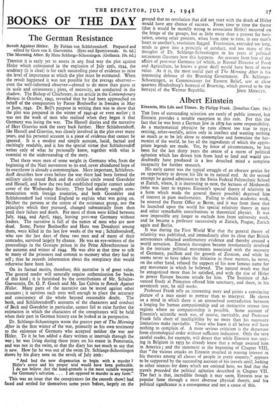BOOKS OF THE DAY
The German Resistance
THOUGH it is early yet to assess in any final way the plot against Hitler which culminated in the explosion of July loth, r944, the tendency (it is clear) is for each succeeding piece of evidence to raise the level of importance at which the plot must be estimated. When the revolt happened it was not possible for the average observer— even the well-informed observer—abroad to do more than guess at its scale and seriousness ; plots, of necessity, are conducted in the shadow. The Bishop of Chichester, in an article in the Contemporary Review in October, 1945, revealed that he had been approached on behalf of the conspirators by Pastor Bonhoeffer in Sweden in May or June, 1942. Dr. Bell's purpose in writing then was to show that the plot was prepared in the winter of 1941-42 or even earlier • it was not the work of men who realised when they began it that Germany was losing the war. The Hassell diaries and the narrative of Herr Gisevius took the story back further. Herr Schlabrendorff, like Hassell and Gisevius, was closely involved in the plot over many years, and his personal account is a piece of evidence that cannot be ignored. It is a modest and simple account, lucid, factual and excitingly readable, and it has the special virtue that Schlabrendoff writes only of what he personally knew, together with what is essential to the understanding of the story.
That there were men of some weight in Germany who, from the beginning of the Nazi movement to its end, never abandoned hope of its overthrow is already a commonplace. More important, Schlabren- dorff describes how even before the war there had been formed the military circle round Beck and the civilian circle round Goerdeler and Hassell, and how the two had established regular contact under cover of the Wednesday Society. They had already sought com- munication with foreign countries, and both Goerdeler and Schlabrendorff had visited England to explain what was going on. Neither the persons at the centre of the resistance group, nor the principles which they pursued, changed substantially from then until their failure and death. For most of them were killed between July, 1944, and April, 1945, leaving post-war Germany without leaders. The narrative is full of the names of men who are now dead. Some, Pastor Bonhoeffer and Hans von Donahnyi among them, were killed in the last few weeks of the war • Schlabrendorff, who saw the last days of these two men and of many of their comrades, survived largely by chance. He was an eye-witness of the proceedings in the Gestapo prison in the Prinz Albrechtstrasse in the autumn and winter of 1944. He was able at that time to talk to many of the prisoners and commit to memory what they had to tell ; thus he records information about the conspiracy that would otherwise have been lost.
On its factual merits, therefore, this narrative is of great value. The general reader will naturally require authentication for books of this kind ; it is furnished by the contributions of Mr. Schulze- Gaevernitz, Dr. G. P. Gooch and Mr. Ian Colvin to Revolt Against Hitler. Many parts of the narrative can be tested against other accounts ; it survives such tests well enough to place the accuracy and consistency of the whole beyond reasonable doubt. The book, and Schlabrendorff's accounts of the characters and conduct of Beck and Goerdeler in particular, cannot fail to raise further the estimation in which the characters of the conspirators will be held when their part in German history can be looked at in perspective.
Dr. Schlange-Schoeningen wrote the greater part of The Morning After in the first winter of the war, primarily as his own testimony to the existence of Germans who accepted neither the war nor Hitler. To it he has added a diary written at intervals through the war ; he was living during those years on his estate in Pomerania, and was not in the swim, so that the diary has not much to say that is new. How far he was out of the swim Dr. Schlange-Schoeningen shows by his diary note on the revolt of July 2oth "And had the new dispensation to begin with a murder ? Hitler's arrest and his proper trial would have been preferable. I do not believe that the hand-grenade is the most suitable weapon for Germany's salvation. ... I am opposed to murder in any form." This was an issue that the conspirators (as the records show) had faced and settled for themselves some years before, largely on the ground that no revolution that did not start with the death of Hitler would have any chance of success. From time to time the theme (that it would be morally wrong to assassinate Hitler) recurred on the fringe of the groups, but as little more than a pretext for hesi- tation, among other pretexts, when from time to time, in one man's heart or another's, resolution flagged. Frustration, extended too long, tends to grow into a principle of conduct, and too many of the thoughts of Dr. Schlange-Schoeningen in his years of political retirement illustrate how this happens. An account from him of the affairs of post-war Germany (of which, as Bizonal Director of Food and Agriculture, he knows a great deal) would have been of more value. As it is, the most useful part of The Morning After is his interesting defence of the Bruening Government. Dr. Schlange- Schoeningen, as Commissioner for Eastern Relief, saw at close quarters Hindenburg's betrayal of Bruening, which proved to be the






































 Previous page
Previous page